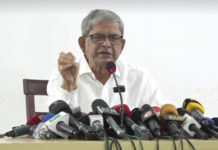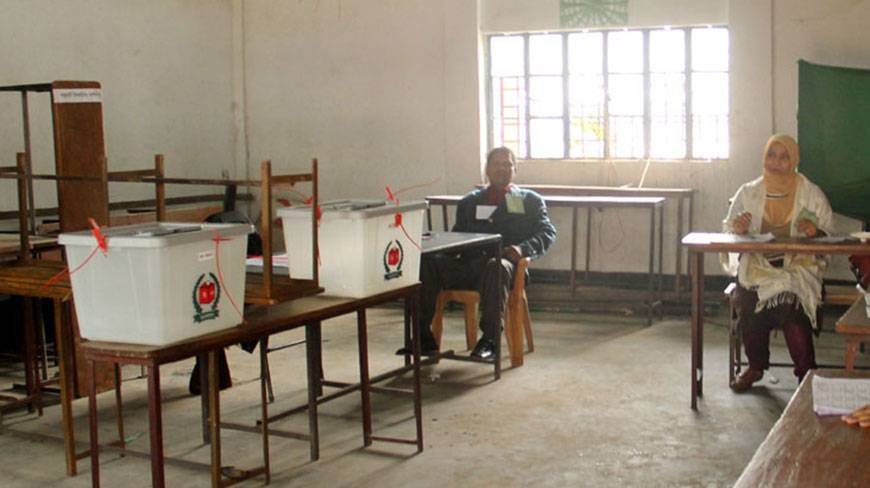Investigators claim to have evidence against the Jamaat leader; report this week
 The investigation agency’s probe into war crimes committed allegedly by Jamaat-e-Islami leader AKM Yusuf, historically known as the founder of the Razakar force, is almost done and it is planning to submit a report this week.
The investigation agency’s probe into war crimes committed allegedly by Jamaat-e-Islami leader AKM Yusuf, historically known as the founder of the Razakar force, is almost done and it is planning to submit a report this week.
Agency officials said they found evidence of Yusuf’s “involvement” in genocide, murders, arson, looting, forced religious conversion of people and deportation during the Liberation War in 1971.
Sanaul Huq, a senior member of the agency, told The Daily Star on Thursday, “We will hand over the probe report [to the prosecution] within next week [this week].”
The agency, through the prosecution, would also seek an arrest warrant from the tribunal for the 84-year-old Jamaat nayeb-e-ameer, he added.
Helal Uddin, investigation officer of the case, said Yusuf established the Razakar force, an auxiliary force of the Pakistani army, on May 5, 1971, at an Ansar camp on Khan Jahan Ali Road in Khulna with 96 Jamaat activists.
Before establishing the force, Yusuf, as the chairman of the Peace Committee of greater Khulna (Khulna, Satkhira and Bagerhat) had formed peace committees in every sub-division, police station and union, said the investigator.
The war crimes suspect had gathered men to form the Razakar force since April 18, 1971, he added.
“We got these pieces of information from victims, eyewitnesses as well as documentary evidence including newspapers and books,” said Helal, adding that he had visited Khulna region four times to gather the information.
According to historic documents, Razakars were active in Bangladesh from May, 1971, but the then Pakistan government formally established the force through a gazette notification on August 2.
The probe agency started the investigation into the alleged crimes of Yusuf, who hails from Rajair Kaliarpar under Sarankhola in Bagerhat, on January 22, 2012.
He is in Dhaka now, sources claimed.
The suspect, as the then ameer of Khulna district unit Jamaat, led all the anti-liberation elements and political parties in the region where the Pakistani army and their collaborators killed at least 1 lakh people, said the investigator.
“Ekattorer Ghatak O Dalalra Ke Kothaye”, a book published by Muktijuddha Chetana Bikash Kendra, would be used as prosecution evidence in Yusuf’s case, agency sources said.
According to the book, Yusuf, who was a member of AM Malek’s cabinet in 1971, monitored activities of several peace committees, Razakar and Al-Badr forces and delivered speeches at different anti-liberation rallies.
Inspecting a Razakar camp in Satkhira on November 12, 1971, Yusuf said, “The Razakars of Satkhira have played a vital role in destroying the Indian agents and infiltrators.” He guaranteed that arrangements would be made to provide jobs for all Razakars, the book reads.
On November 28, 1971, speaking to journalists at Karachi in Pakistan, Yusuf said, “The Razakars are standing shoulder to shoulder with our brave soldiers in combating the Indian aggression.”
He suggested that the Razakars should be provided with more modern weapons in order to annihilate “miscreants”, read the book.
The Pakistan government, army and their collaborators used to identify the freedom fighters as “Indian agents”, “infiltrators”, “miscreants” and termed the Liberation War “Indian aggression”.
The sources said Yusuf was arrested under the Collaborator Order, 1972, after independence but was released after cancellation of the law on December 31, 1975.
Meanwhile, investigation against another war crimes suspect Faridpur BNP leader MA Zahid Hossain Khokon, who is on the run, is likely to be completed within this month, investigators said.
The international crimes tribunals have already delivered verdicts against two Jamaat leaders Abdul Qader Mollah and Delawar Hossain Sayedee while two war crime cases against former Jamaat chief Ghulam Azam and Muhammad Kamaruzzaman are awaiting verdict delivery.
Expelled Jamaat member Abul Kalam Azad was also sentenced to death.
Besides, Jamaat Ameer Motiur Rahman Nizami and General Secretary Ali Ahsan Mohammad Mojaheed are facing the trials. Investigations against three detained Jamaat leaders — Mir Quashem Ali, Abdus Sobhan and ATM Azharul Islam — are underway.
Source: The Daily Star









